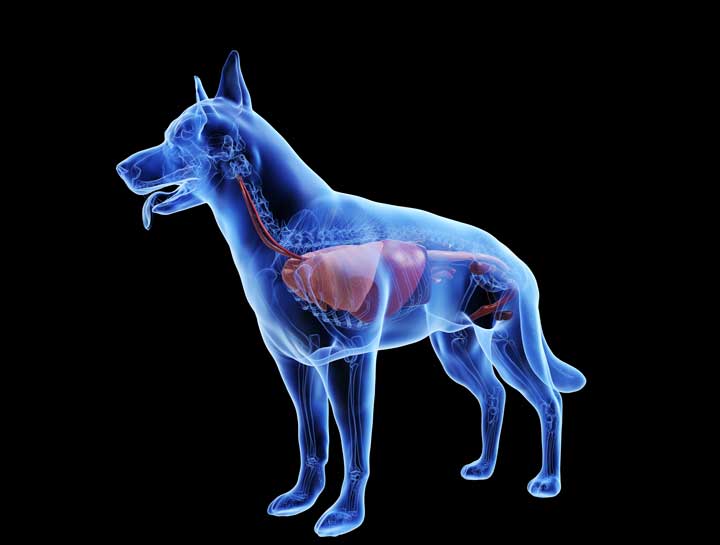Gastroenterology
Involving any problem of the gastrointestinal tract.
While vomiting and diarrhea are one of the most common reasons that a pet is presented to a veterinary hospital, gastroenterology involves any problem of the gastrointestinal tract (GIT) from the esophagus to the stomach, small intestine or large intestine (colon). A patient experiencing gastrointestinal (GI) disease will commonly exhibit vomiting, diarrhea, a decreased appetite, or even regurgitation. Most pet owners are able to recognize that their pet is ill and in need of veterinary attention when they have vomiting and/or diarrhea multiple times within a 24-48 hour period (acute illness). It is critical that your pet be evaluated by a veterinarian as soon as possible as some causes of acute vomiting and/or diarrhea can quickly become life threatening. The sooner we are able to examine, diagnose and treat your sick companion, the less likely your pet will experience secondary complications resulting in a more prolonged and typically more serious illness.
Vomiting involves active abdominal contractions that expel stomach contents. Pets will commonly vomit bile (yellowish fluid from the stomach), undigested or partially digested food or sometimes foreign objects that they have consumed (ie. pieces of toys, clothing, rocks etc.). It is very worrisome if there is blood in your pet’s vomit. A common misconception we encounter is that owners believe occasional vomiting is normal. They explain that their pet simply eats or drinks too fast, has hairballs (cats), or their pet has a sensitive stomach and is just a “vomiter.” While occasionally these descriptions can be true, in the majority of cases, vomiting is a sign of illness. As an example, a shorthair cat should only produce a hairball twice yearly, and a longhair cat only four times annually. A feline that vomits more often than this should be evaluated by a veterinarian to look for an underlying medical problem instead of attributing the vomiting episodes to hairballs. Even if your pet appears healthy to you but experiences intermittent vomiting, it is wise to have them evaluated by a veterinarian.
A behavior that is commonly confused with vomiting is regurgitation. Regurgitation is the passive expulsion of stomach contents. In this case, the pet is not having abdominal contractions or retching. The food (ingesta) merely comes up, often surprising the animal. It is critical to distinguish between the two behaviors as their causes and treatments are quite different.
Changes in your pet’s feces that can indicate a medical problem are anything from an intermittent soft stool to liquid diarrhea to very firm (almost hard) stool. A pet with abnormal feces may experience an increased frequency of bowel movements, flatulence (gas), straining to defecate, urgency (accidents in the house), or sometimes the stool may even contain mucus or blood. Blood from the upper GIT (stomach and small intestine) may cause your pet’s feces to appear black and tarry. Some pets with chronic small intestinal disease will demonstrate larger volumes of feces and weight loss.
Once it has been determined that your pet is experiencing an acute or chronic gastrointestinal problem, we will set out to diagnose it. One of our veterinarians will ask you numerous detailed questions about your pet’s illness. A thorough and complete physical examination of your pet will subsequently be performed, and this, along with the severity of your pet’s symptoms will help guide our recommendations. Some causes of gastrointestinal disease may be easily detected through simple testing of your pet’s feces, while other patients may need blood work, radiographs, urine testing, or even an abdominal ultrasound with our board certified radiologist to determine the cause of their illness. At Polo Springs Veterinary Hospital, we have a broad range of preliminary and advanced diagnostic tests to utilize when your pet is in need. Because these tests are readily available onsite, we are able to diagnose your pet quickly so affective treatment can begin.
Treatment options will vary depending on your pet’s diagnosis. In emergency situations, some patients may require life saving abdominal surgery or intensive care to recover from their illness. In all situations, we always strive for a cure, but there are diseases that cannot be permanently resolved and will therefore require long-term management.
Whether your pet is experiencing an easily treatable stomach problem, or a chronic, life-long gastrointestinal disease, it is our duty to thoroughly educate you on your pet’s condition, devise an appropriate treatment plan, and work with you to get your beloved companion back on the road to recovery as rapidly as possible. In addition to having a fully stocked pharmacy, we also carry a range of therapeutic/prescription diets as well as dietary supplements (including, but not limited to, veterinary probiotics and free form patented high potency fatty acids). Our veterinarians would rather manage gastrointestinal disease with as few prescription medications as possible, preferring instead the use of special diets and/or supplements when appropriate.
We will work with you as a team to provide the optimum care for your pet and to adjust our treatment plan as your pet responds to therapy. Gastrointestinal disease can be ongoing, frustrating, or at the very least messy for pet owners. We are here to provide you with diagnostic and treatment options to get your beloved companion happy and healthy once again.
Call us at (719) 264-8384 today to schedule your pet's next appointment.

